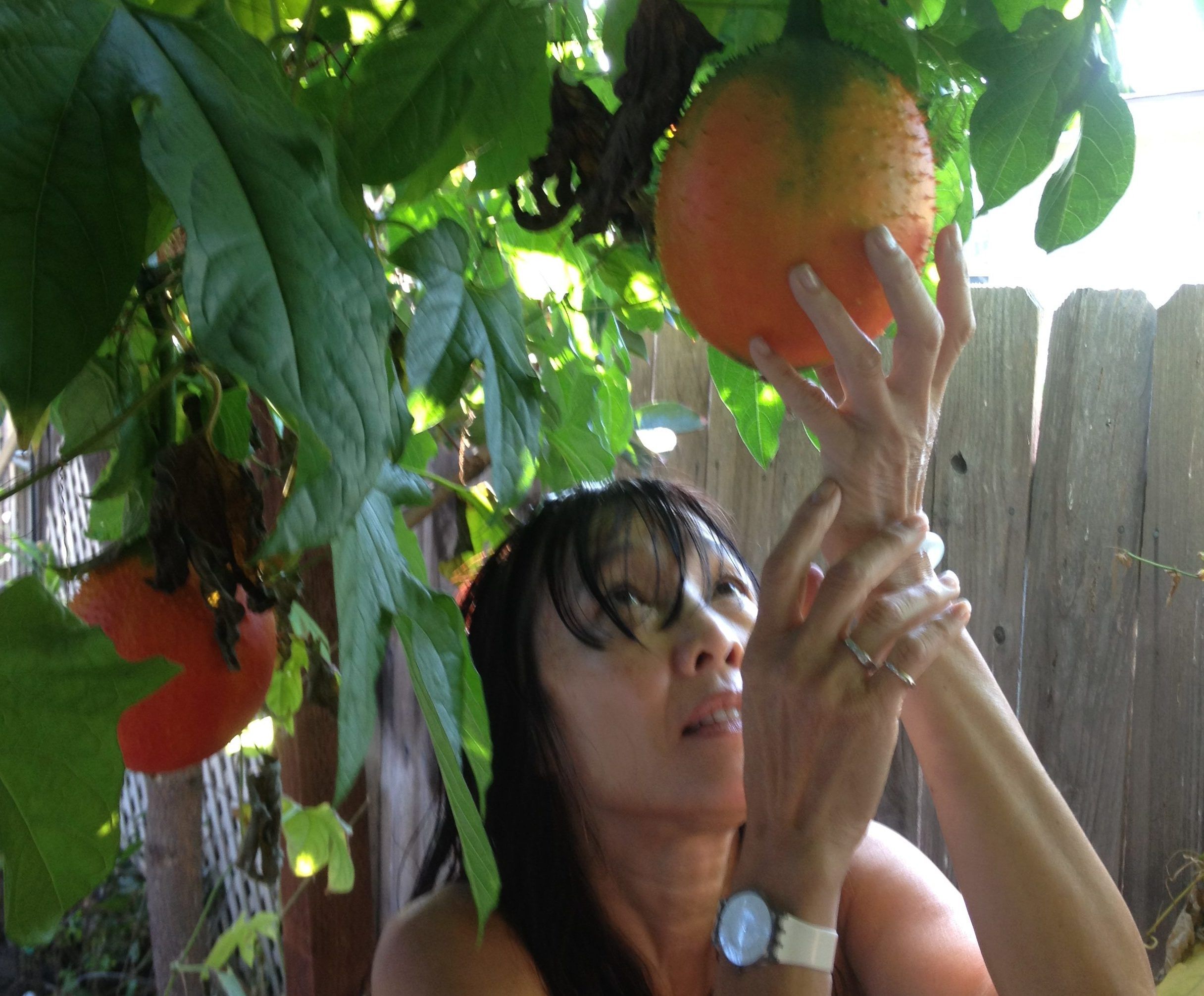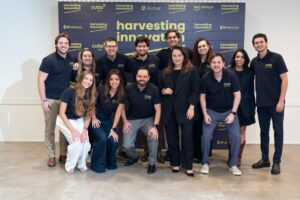Le Vuong is the CEO and founder of Fishrock Labs, a startup she launched in 2012 in Davis, California, which operates as the Redmelon Company. The company’s flagship product is Redmelon oil, an extract from Gac, a fruit also known as Momordica cochinchinensis, which is found throughout the Southeast Asia region. The oil is rich in carotenoids and antioxidants and is used as a natural food colorant, antioxidant, food supplement, and as a carrier for other ingredients. Redmelon uses an extraction method that retains the nutrients from the plant and avoids using organic solvents. The company is actively seeking to partner with other food and ingredient producers to expand its product lines and market.
Vuong has a PhD in Nutrition with a focus in clinical nutrition and food chemistry from the University of California, Davis. The next in our series of interviews with female CEOs and founders working in agtech, AgFunderNews caught up with Vuong to find out more about Redmelon Company and being a minority female entrepreneur in agtech.
Tell us about your background
I came to America at the end of the Vietnam war in 1975 as a refugee. At college, I was advised by my father to go to med school, but after two years I changed course and completed a bachelor’s degree in computer science from California Polytechnic University, and subsequently earned my Masters in Business Administration from California Lutheran University. A decade later I decided to go back to school and obtained a PhD in Nutrition with a focus in clinical nutrition and food chemistry at UC Davis. I got into this for several reasons including my daughter’s health problems; I was frustrated with my ignorance when it came to the human metabolic system. I also have a fascination with food.
How many years do you have in agrifood tech?
If you count my PhD work, I would say 20 years.
Why did you choose to go into agriculture and agtech?
I always liked plants, flowers, and enjoy experimenting with foods. Growing up in Vietnam, surrounded by so many different types of fruits, vegetables, plants, and animals, I was fascinated with how life can be maintained properly just by knowing and having the right foods. I strongly believe in the idea of “let food be your medicine.” Agriculture and agtech are fields where I can apply my knowledge to satisfy my interest, and perhaps make a difference in the lives of the many people where access to the right foods may still be a challenge.
Why did you launch your company and what are your responsibilities?
Growing up in Vietnam and witnessing firsthand the cost of malnutrition, the topic of my PhD thesis was to find a food-based solution to the problem of vitamin A deficiency in children and young mothers in rural Vietnam. After conducting anthropological and analytical studies, I identified a plant source of vitamin A that’s indigenous to the area. The Vietnamese name is Gac. I came up with a non-solvent method to extract the oil from the fruit, which contains a high concentration of beta-carotene and named it Redmelon Oil. I then carried out a large clinical trial to see if daily use of the oil could improve the nutritional status of vitamin A deficient children. The results were so positive that I decided to start a company to bring Redmelon Oil to the markets. I devise the extract process, formulation of products, and work with growers to improve quality and quantity of my products.
What is your competitive edge?
We are the only company in the US producing red melon oil using our patented process. Other products from our process include red melon powder, and a whole host of materials used in many applications including cosmetics, supplements and animal feeds. Our process uses no toxic solvents, not even alcohol, and can retain all nutrients from red melon such as vitamin E, essential fatty acids (omega-3,6,9), and other carotenoids such as lutein and lycopene. Red melon oil can be used as a food supplement or added to other foods as a natural antioxidant or colorant. Vitamin A and vitamin A associated anemia are still major problems in most of the developing world. Red melon oil, extremely high in beta-carotene and lutein, can also address problems such as anemia and macular degeneration.
What are your short and medium term goals for the company?
Securing the red melon source for the next five years and partnering with other companies with distribution channels to expand market share.
What are the next steps for the company?
Raising capital to scale up production
Why is it an exciting time to be in this space/industry?
More than ever the importance of ag and agtech is definitely in focus. As populations grow, people want to live longer and have a healthy life meaning improving our food system is vital. I am very excited to be in this space.
What are some of the biggest challenges for agtech start ups?
In drug development, the challenge is mainly the regulatory hurdle of taking a compound from the lab bench to the market. In agtech, taking an idea from the lab to the dining table is capital intensive, not only in marketing and distribution but also in controlling the source, the quality of the crop and the processes.
Why are there so few women in agtech?
In my opinion, the scarcity of women in agtech is because agtech does not have the same image and creativity of other fields such as fashion, or architecture, nor is it considered as prestigious as medicine or education. However it is changing; the field is now broader and encompasses other disciplines such as IT, design, textiles. I envision more and more women will be attracted to agtech in the future.
Being a woman in a male-dominant industry, what are some of the challenges that you have faced and how did you tackle them?
The challenge I face as an Asian female entrepreneur in the agtech field is that most of my colleagues are male and thus I am expected to behave like a man, or I’m treated as such. I was invited to a meeting in Korea, and as I showed up at the airport, two young girls from the company who were assigned to pick me up took me to a hotel they had selected for me. The room could only be locked from the inside, and later I found out that it was only rented by the hour. It was not apparent to me until I returned to the US that the male CEO of the company assumed that since I was the CEO of an agtech company, I must be a man. On another occasion, also in Southeast Asia, I was scheduled to meet with a committee in charge of the province’s hospital. As I walked into the room of about a dozen men, and no woman, I noticed that all eyes were glued to the TV screen mounted in one corner of the room, which showed images of naked women in the Playboy channel. One of the men in the room even asked if I could be the translator for them.
The way to tackle the problem is to show my male colleagues how committed I am to my work, and that I am capable of carrying out my work. Since there are so few women in the field, women are perceived as not as capable or not having the “rough and tough” to deal with tasks that have traditionally been the male domain. This problem is heightened in Asia, although women have long been the crop growers and harvesters.
What do you think would change that?
As more and more women enter the field and demonstrate their capabilities, it will become easier to change the perception. Having more women in the field increases opportunities to interact with women to share knowledge and network, and continue self-reinforcing the importance of having more women entrepreneurs, investors, mentors, business partners, and leaders.





